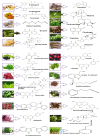Phytochemicals and PI3K Inhibitors in Cancer-An Insight
- PMID: 29311925
- PMCID: PMC5736021
- DOI: 10.3389/fphar.2017.00916
Phytochemicals and PI3K Inhibitors in Cancer-An Insight
Abstract
In today's world of modern medicine and novel therapies, cancer still remains to be one of the prime contributor to the death of people worldwide. The modern therapies improve condition of cancer patients and are effective in early stages of cancer but the advanced metastasized stage of cancer remains untreatable. Also most of the cancer therapies are expensive and are associated with adverse side effects. Thus, considering the current status of cancer treatment there is scope to search for efficient therapies which are cost-effective and are associated with lesser and milder side effects. Phytochemicals have been utilized for many decades to prevent and cure various ailments and current evidences indicate use of phytochemicals as an effective treatment for cancer. Hyperactivation of phosphoinositide 3-kinase (PI3K) signaling cascades is a common phenomenon in most types of cancers. Thus, natural substances targeting PI3K pathway can be of great therapeutic potential in the treatment of cancer patients. This chapter summarizes the updated research on plant-derived substances targeting PI3K pathway and the current status of their preclinical studies and clinical trials.
Keywords: 5-bisphosphate (PI3K); Mammalian TORC pathway; Mitogen-activated protein kinases (MAPK); cancer; clinical trials; phosphatidylinositol-4; phytochemicals.
Figures


Similar articles
-
Phytochemicals and Nanoparticles in the Modulation of PI3K/Akt/mTOR Kinases and its Implications in the Development and Progression of Gastrointestinal Cancers: A Review of Preclinical and Clinical Evidence.Recent Pat Anticancer Drug Discov. 2023;18(3):307-324. doi: 10.2174/1574892817666220606104712. Recent Pat Anticancer Drug Discov. 2023. PMID: 35670354 Review.
-
PI3K/AKT/mTOR signaling pathway as a therapeutic target for ovarian cancer.Arch Gynecol Obstet. 2014 Dec;290(6):1067-78. doi: 10.1007/s00404-014-3377-3. Epub 2014 Aug 3. Arch Gynecol Obstet. 2014. PMID: 25086744 Review.
-
Phytochemicals as PI3K/ Akt/ mTOR Inhibitors and Their Role in Breast Cancer Treatment.Recent Pat Anticancer Drug Discov. 2020;15(3):188-199. doi: 10.2174/1574892815666200910164641. Recent Pat Anticancer Drug Discov. 2020. PMID: 32914720 Review.
-
Attacking the PI3K/Akt/mTOR signaling pathway for targeted therapeutic treatment in human cancer.Semin Cancer Biol. 2022 Oct;85:69-94. doi: 10.1016/j.semcancer.2021.06.019. Epub 2021 Jun 25. Semin Cancer Biol. 2022. PMID: 34175443 Review.
-
Dietary phytochemicals in colorectal cancer prevention and treatment: A focus on the molecular mechanisms involved.Biotechnol Adv. 2020 Jan-Feb;38:107322. doi: 10.1016/j.biotechadv.2018.11.011. Epub 2018 Nov 23. Biotechnol Adv. 2020. PMID: 30476540 Review.
Cited by
-
Polyphenol Containing Sorghum Brans Exhibit an Anti-Cancer Effect in Apc Min/+ Mice Treated with Dextran Sodium Sulfate.Int J Mol Sci. 2021 Aug 1;22(15):8286. doi: 10.3390/ijms22158286. Int J Mol Sci. 2021. PMID: 34361052 Free PMC article.
-
Upregulated hsa_circRNA_100269 inhibits the growth and metastasis of gastric cancer through inactivating PI3K/Akt axis.PLoS One. 2021 Apr 26;16(4):e0250603. doi: 10.1371/journal.pone.0250603. eCollection 2021. PLoS One. 2021. PMID: 33901239 Free PMC article.
-
Identification of promising nutraceuticals against filarial immune-modulatory proteins: insights from in silico and ex vivo studies.RSC Adv. 2022 Aug 11;12(35):22542-22554. doi: 10.1039/d2ra03287b. eCollection 2022 Aug 10. RSC Adv. 2022. PMID: 36105981 Free PMC article.
-
Dietary Phytochemicals Targeting Cancer Stem Cells.Molecules. 2019 Mar 4;24(5):899. doi: 10.3390/molecules24050899. Molecules. 2019. PMID: 30836718 Free PMC article. Review.
-
Metabolite Profiling of Colvillea racemosa via UPLC-ESI-QTOF-MS Analysis in Correlation to the In Vitro Antioxidant and Cytotoxic Potential against A549 Non-Small Cell Lung Cancer Cell Line.Plants (Basel). 2024 Mar 28;13(7):976. doi: 10.3390/plants13070976. Plants (Basel). 2024. PMID: 38611505 Free PMC article.
References
-
- Ahmad A., Biersack B., Li Y., Kong D., Bao B., Schobert R., et al. . (2013). Targeted regulation of PI3K/Akt/mTOR/NF-κB signaling by indole compounds and their derivatives: mechanistic details and biological implications for cancer therapy. Anti Cancer Agents Med. Chem. 13, 1002–1013. 10.2174/18715206113139990078 - DOI - PMC - PubMed
-
- Al-Amri A. M., Bamosa A. O. (2009). Phase I safety and clinical activity study of thymoquinone in patients with advanced refractory malignant disease. Shiraz E Med. J. 10, 107–111.
Publication types
LinkOut - more resources
Full Text Sources
Other Literature Sources

